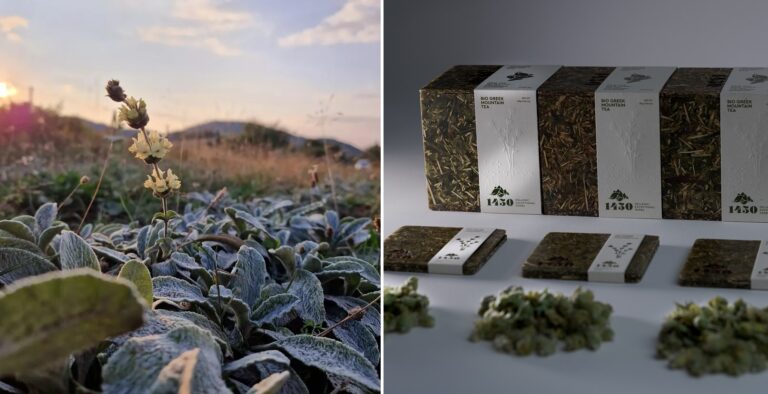
With the nostalgia of their childhood years taking them back to those summers in the village when they picked mountain tea with their father in the mountainous massif of Grammos, the brothers Vassilis and Efthymis Efthymiou, both economists by profession, close today in a box all their passion and love for the natural gift of the Kastorian land.
Mountain tea or otherwise according to its scientific name, Sideritis and more specifically Sideritis Raeseri, the variety that is found in the village of Kotyli in Kastoria and at an altitude of 1450 metres and that with absolute commitment to the bucolic lessons of yesterday, the Efthymiou brothers, today, collect and launch on the shelves of Greek and European delicatessens.
"We insisted on the pure cultivation and marketing of the variety in question that grows in our village and did not prefer another, perhaps more commercial, because we want to give the consumer the unadulterated taste of our land and place," Vassilis explains to me.
"Besides," adds Efthymis, "let's not forget that nature created everything in wisdom. Since this variety has proven to present such good organoleptic data and the soil can produce something of such quality, we have no reason to intervene."
"After all, in a radius of 30 kilometers around our estates there is no other crop, so we ensure that our product remains pure from spraying, while we also keep our land fenced and therefore protected from any type of external intervention, such as e.g. from wild animals."
The tea of the Efthimiou brothers, which carries the easily associated brand name "1450", has managed since 2014 when it was first released on the market until today, to accompany its course with a total of six international awards (at the Taste Awards in London), to open paths for foreign markets and, at a local level, to find recently competent imitators who, taking advantage of the natural wealth of the region, in turn made available this particular variety of tea in the wholesale trade.
The life cycle of this variety is 7 or 8 years in the lowlands and 4 years in the mountains. The planting is renewed annually, as it takes about two years to bear fruit.
The microclimate of the area with its high levels of humidity, the noticeable changes in temperature level (this change between heat and cold acts as a natural air conditioner) and the intense snow cover also help the seed to thrive and give its flowers.
"At 1500 metres altitude everything is covered by snow and this is something we need for the crops, so that the plant can 'rest' for about 4-5 months, fall as we say here into hibernation, while at the same time under the soil the mechanism of his development to work at an intensive pace," Efthymis said.
Nature as a regulator in the cultivation process
"If we exclude the moment of planting," Vassilis explains to me, "when our plant needs watering, nature does everything else by itself and from then on we take action, doing everything by hand: pruning, harvesting, the sorting and finally the drying which is done with the old traditional methods and the use of beds on which our harvest is spread."
The harvest is done once a year. Lowland growers begin in early June to late May.
"We," Efthymis says, "start from mid-July onwards."
"First from the low, at 1300 metres altitude and gradually we reach 1500 metres, where the harvest takes place at the end. In general, the higher the altitude, the longer the ripening and therefore the harvest," he added.
Circular economy and ecological awakening in one package
In the packaging of "1450", which is made with environmentally friendly materials (braille was also used for the visually impaired), one will not find the classic dried bunch with all the parts of the plant.
"We select and break the buds one by one with our hands" Vassilis explains to me "in order to isolate in our packaging only the product that can be used".
As for the fire?
"Nothing goes to waste" they explain to me, as "according to the standards of the circular economy, recycling is done and what is intended for disposal is reused for the manufacture of luxury storage boxes which contain, in the retail packaging philosophy, mountain tea flowers and coaster".
A pleasant surprise is also the fact that the Efthimiou brothers promote the universal abolition of the use of plastic at any point in their production process, such as in the bag they store their product in, which is made of corn.
Loukia Chrysovitsanou is a correspondent for Olive Magazine.
READ MORE: TasteAtlas: Which 2 Greek drinks made the "Best Liqueurs in the World" list?